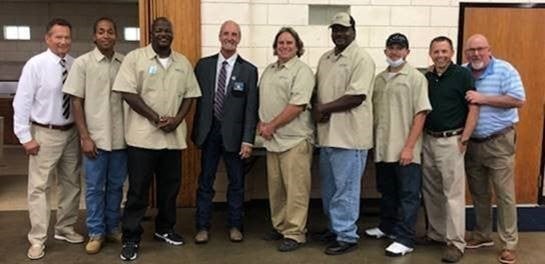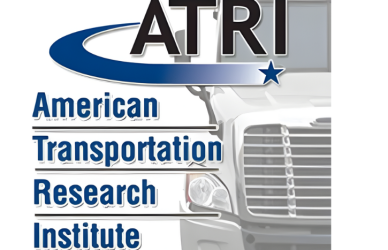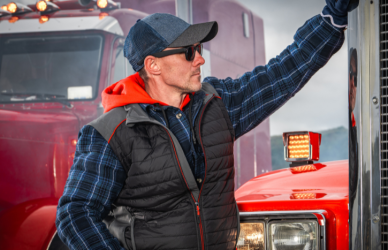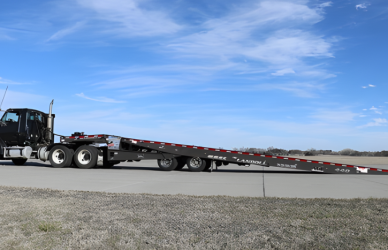Freymiller is a beacon of opportunity, setting a benchmark in the conversation of fair chance hiring with its Second Chance Program. This initiative, a collaboration involving the Oklahoma Department of Corrections (ODOC),
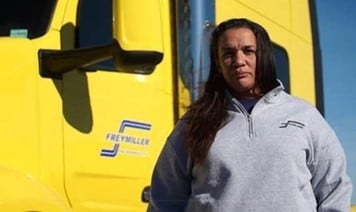
Career Tech, Central Tech Truck Driving School, and Freymiller itself, is dedicated to transforming the lives of former felons by training them to excel as professional truck drivers.
The roots of this initiative trace back to when Betsy Waldrop took on the role of Recruiting and Training Director at Freymiller. Just a couple of months into her new position, President and CEO David Freymiller proposed the idea of a second chance program. With the company having relocated to Oklahoma City in 1994 and experienced significant support from the community, it seemed like the right time to give back.
“Honestly, it scared me. It felt like such a big task and I didn’t know where to begin,” shares Waldrop about the initial proposal. “I sat on it for a couple of days worrying about it.”
The very next weekend, a television segment featuring Kris Steele, a former Speaker of the House in Oklahoma, inspired Waldrop. Steele discussed an organization focused on using education and training to break the cycle of incarceration. Motivated by his insights, Waldrop connected with Steele, setting the wheels in motion for what would become a groundbreaking partnership.
“He got me in touch with the right people I needed to talk to and I had meetings scheduled within a week,” she recounts.
The program’s inception was met with challenges. John Thorpe, Director of Central Tech Truck Driving School, recalls previous attempts to launch similar initiatives. “We just hit a lot of roadblocks,” Thorpe explains. “We tried to work with the ODOC for two or three years and could never make it happen.”
However, the involvement of Freymiller marked a turning point. “Freymiller’s involvement changed everything. When you have a company like Freymiller who will back and hire these people right when they get out of prison, it is invaluable,” asserts Thorpe. “This is a partnership like no other in the industry. It’s taken us four years to master this program and we’re proud of what we’re doing here.”
Traditionally, many trucking companies hesitate to hire individuals with recent convictions. Freymiller’s approach is distinctive, offering opportunities to those freshly released from Oklahoma prisons. The rigorous vetting process ensures that candidates are well-suited to the program’s demands.
“We’re in the business of changing lives,” states Waldrop. “These drivers are breaking the cycle.”
– A few who have graduated from the Freymiller Second Chance Program. Barrett Davidson, Career Tech, 2nd from the right, John Thorpe, Central Vo-Tech far right.
The program commenced with a pilot class of six probationary individuals. Through collaboration among Waldrop, Thorpe, and Barrett Richardson, Career Tech’s Project Manager, the team refined the selection process and identified the ideal candidates.
“Throughout this process, we’ve learned how to pick the right people,” notes Thorpe. “We’ve also found interviewing them together really helps because these students are able to understand the expectations of the school and Freymiller.”
Richardson spearheads the initial vetting process, relying on a network of probation officers and counselors for referrals. Occasionally, candidates learn of the program through word-of-mouth.
“I’ve kept this program a little close to my vest because I didn’t want to get overwhelmed. We can only train so many people per fiscal year,” Richardson explains. “We also want to make sure these people understand what the process entails and are willing to work hard to make it happen.”
The process takes time, as many incarcerated individuals need to regain their driver’s licenses. Richardson and his team assist them with gathering all necessary documents, though it can take months to complete the steps required for a driver’s exam.
“A lot of these guys are on work release status and save a portion of their money for when they get out,” Richardson elaborates. “We have to identify potential students who actually have the means to be able to gather all the documents they need and who are financially able to get these first steps going.”
Richardson emphasizes selecting candidates committed to sobriety and demonstrating maturity. “The number one thing is we’re choosing people who will be safe,” he adds. “We also look for individuals who show a high level of maturity. People who are ready to close this chapter of their lives and make something of themselves.”
The meticulous vetting process takes several months, providing ample opportunity for candidates to demonstrate their readiness. Waldrop, Thorpe, and Richardson all agree that this is a second chance program – there’s no room for third chances.
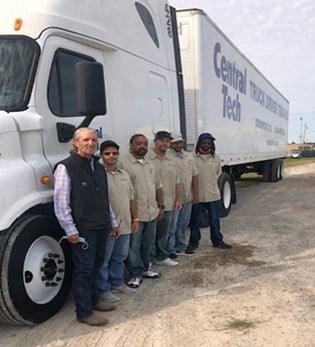
Once accepted, candidates undergo an intensive 28-day training program at Central Tech, learning alongside traditional students. “From the very beginning, we’re all about protecting these students. We always stress to them this new beginning starts with a clean slate,” Waldrop explains. “We don’t go around telling people these are second chance students – they’re just another student like everyone else. When they get to Freymiller, it’s the same thing. Outside of a handful of people, no one knows their story.”
They have also expanded to include classes specifically for women, and have already hired some of those graduates to work for the company.
“Even though drivers may not always end up at Freymiller, our main goal was always to give back to the state and provide employment for these individuals. As long as they are gainfully employed we’ve done our part.” Waldrop emphasizes. “This program is changing lives.”
“The majority of people in the prison system today will be out in 3-5 years. They’re coming back to our communities. They have to have a job which pays enough to pay rent and build a future,” says Richardson. “With this second chance program with Freymiller, these guys can be making $70-$90k a year or more. It’s a career. It’s life changing money.”
“A lot of the men and women we’ve trained through this program, they’re good people who just messed up and got caught,” Thorpe adds. “I’ll admit I was a skeptic. Now since I’ve seen what it’s done for people, it’s one of the best things we’ve done at our school. I think once other states see what we’ve done here, you’re going to see a lot more of it too.”
This program wouldn’t exist without Freymiller’s dedication and vision. “It makes us feel really good to hear and know all the years of work was worth it,” Waldrop reflects. “We’re glad we can make a positive impact on the state of Oklahoma and have others see what we do. I’ve been in this industry for 20 years and this is the most fulfilling project I’ve ever worked on.”
To those considering similar initiatives, Waldrop offers a note of caution and encouragement. “We kept this under wraps for quite a while because we wanted to make sure this really worked,” she says. “This is an incredible way to bring good drivers into your fleet. Even more, it gives these individuals a way out and the opportunity to change their lives. They’re getting married, buying houses, saving for retirement and finally feel like they have hope for the future.”


